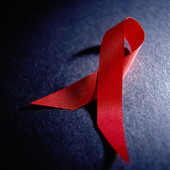 |
 |
 |
||
    |
||||
|
||||

Gene Therapy Holds Promise for HIV
But research is preliminary and more trials are needed, study says|
|
HealthDay
Sunday, February 15, 2009
 SUNDAY, Feb. 15 (HealthDay News) -- Researchers are reporting promising results from the largest clinical trial of gene therapy for HIV patients. The findings, while encouraging, need to be replicated and more research must be done before an effective new treatment arrives, experts said.
SUNDAY, Feb. 15 (HealthDay News) -- Researchers are reporting promising results from the largest clinical trial of gene therapy for HIV patients. The findings, while encouraging, need to be replicated and more research must be done before an effective new treatment arrives, experts said.
"We know it works, but we need to make it better before we launch a later study," said study lead author Dr. Ronald Mitsuyasu, director of the University of California, Los Angeles Center for Clinical AIDS Research and Education.
Existing treatments work fairly well for many people with HIV, the virus that causes AIDS. But patients have to take expensive drugs for their entire lives, and side effects can be significant.
Gene therapy is considered a possible alternative to drug treatment. Researchers hope to fight the virus by inserting a gene or genes into the body of an infected individual.
Last week, the New England Journal of Medicine reported a case that showed the potential for gene therapy and HIV. According to the journal, the body of a man in Germany with AIDS became free of the virus after he received a bone marrow transplant from a man with a gene that made him virtually immune to HIV. The treatment may not be a cure because the AIDS virus can become undetectable while still remaining in the body.
In the new study, researchers focused on a molecule that targets the AIDS virus. The scientists recruited 74 HIV-positive people and intravenously gave them either the molecule -- called OZ1 -- via blood stem cells, or a placebo. The patients then cycled on and off their HIV drugs so the researchers could see if the virus rebounded.
The patients who got the gene therapy treatment had a "modest decline" in the level of virus in their bodies, Mitsuyasu said. After 100 weeks, immune systems were also stronger in those patients who received the gene therapy vs. those who did not. In fact, some patients are doing so well that they haven't returned to drug treatment, Mitsuyasu said.
The findings were published online Feb. 15 in the journal Nature Medicine.
The study was a "phase II" trial, meaning that a third study would be necessary before the treatment could be approved.
There's more to be done, however, Mitsuyasu said.
"We need to figure out how best to perfect this approach. There are a lot of things that we could potentially do," he said. But in the big picture, the research represents "the first clear indication in a randomized and controlled study that there is a biologic effect of gene therapy" for HIV, he added.
The new approach holds promise, said Rowena Johnston, vice president of research at the Foundation for AIDS Research (amFAR) in New York City.
"One of the striking successes of this particular approach is its apparent safety, which is no small matter given the history so far of gene therapy interventions," she said. "Gene therapy will probably represent an exciting new frontier that will receive increasing attention in the coming years. There are so many unexplored avenues to pursue with the real potential to provide a lasting solution for HIV/AIDS."
HealthDay
Copyright (c) 2009 ScoutNews, LLC. All rights reserved.
Related News:
More News on this Date
Related MedlinePlus Pages:
| Home | Health Topics | Drugs & Supplements | Encyclopedia | Dictionary | News | Directories | Other Resources | |
| Disclaimers | Copyright | Privacy | Accessibility | Quality Guidelines U.S. National Library of Medicine, 8600 Rockville Pike, Bethesda, MD 20894 National Institutes of Health | Department of Health & Human Services |
Date last updated: 16 February 2009 |
